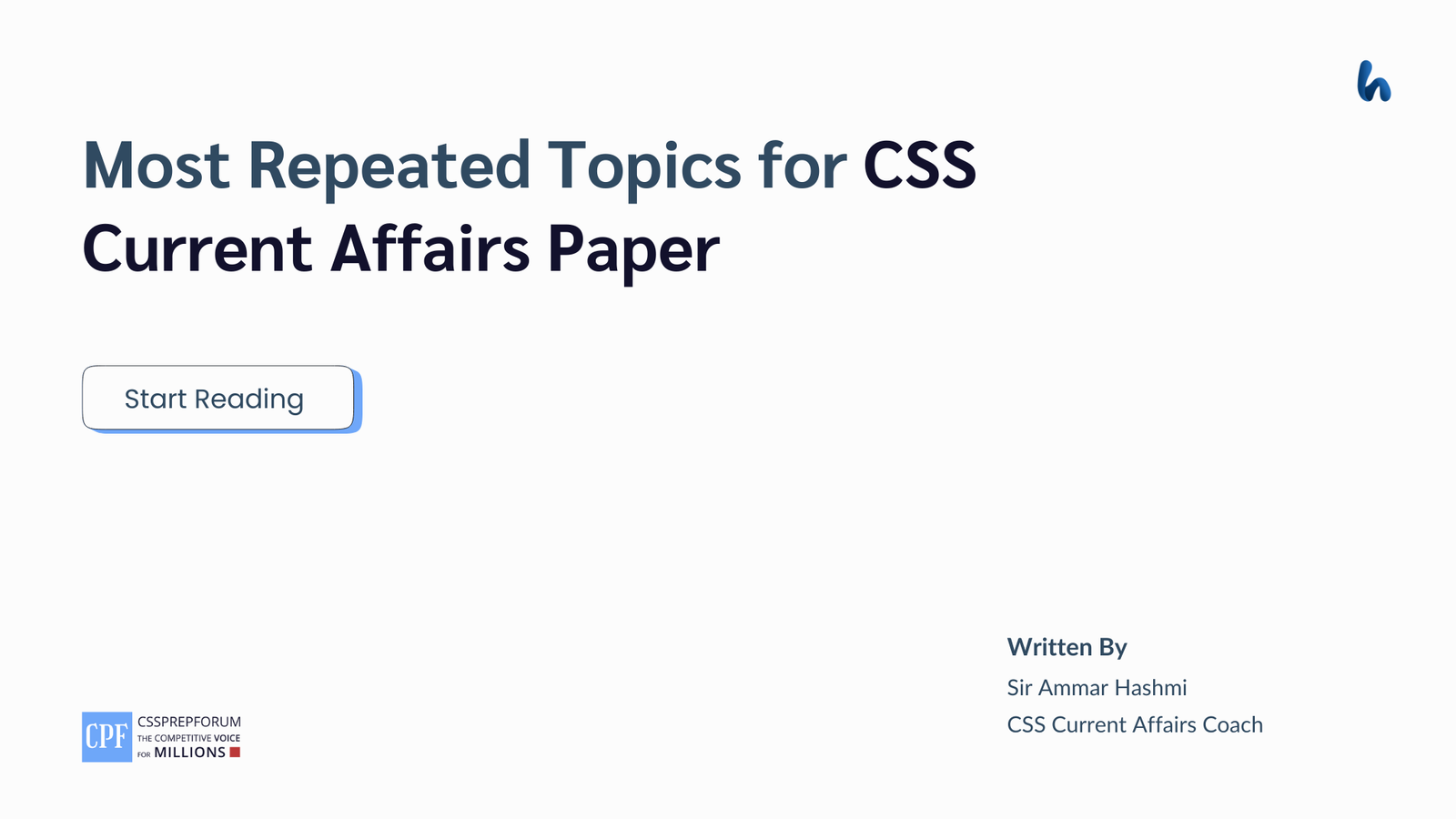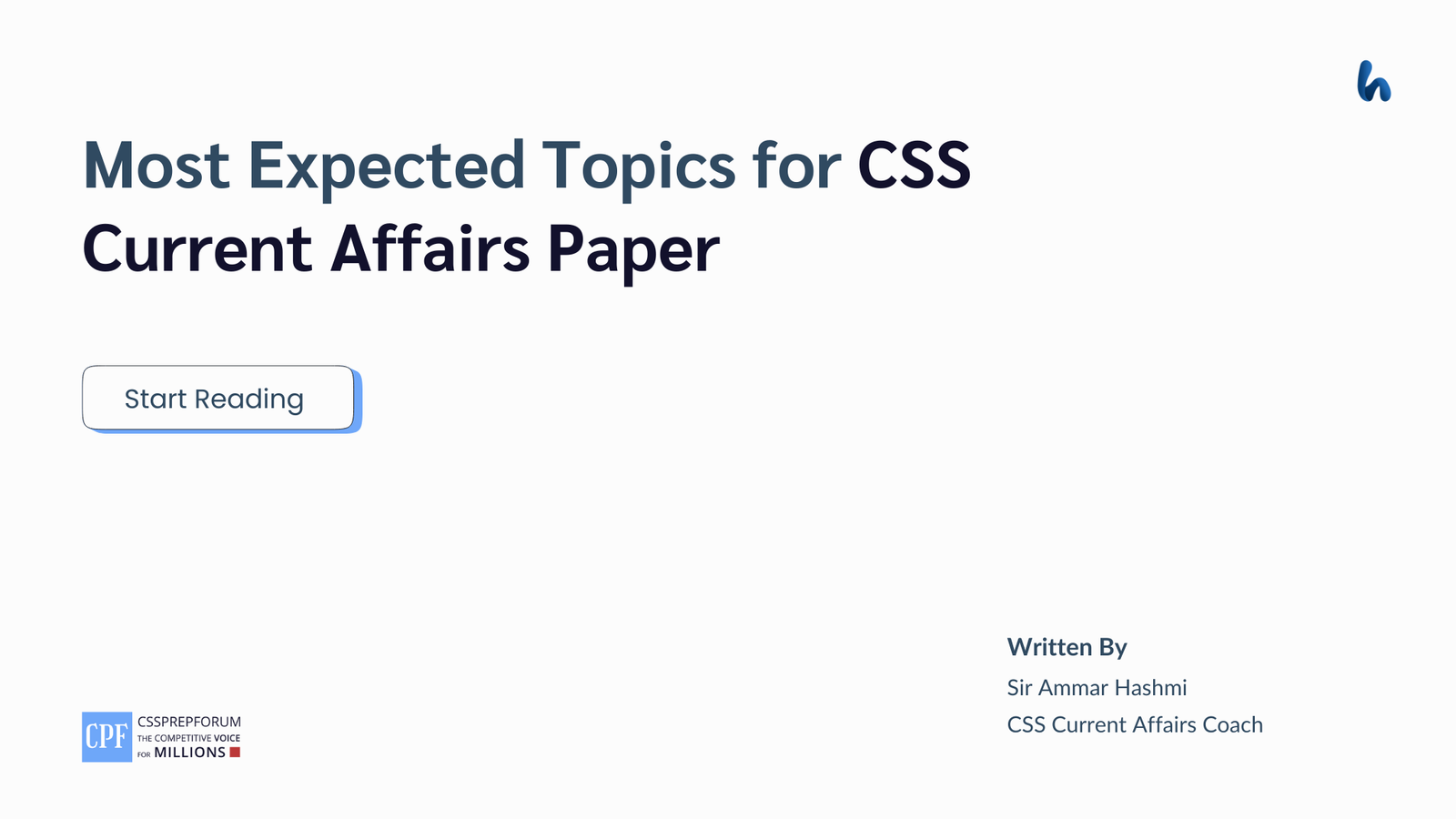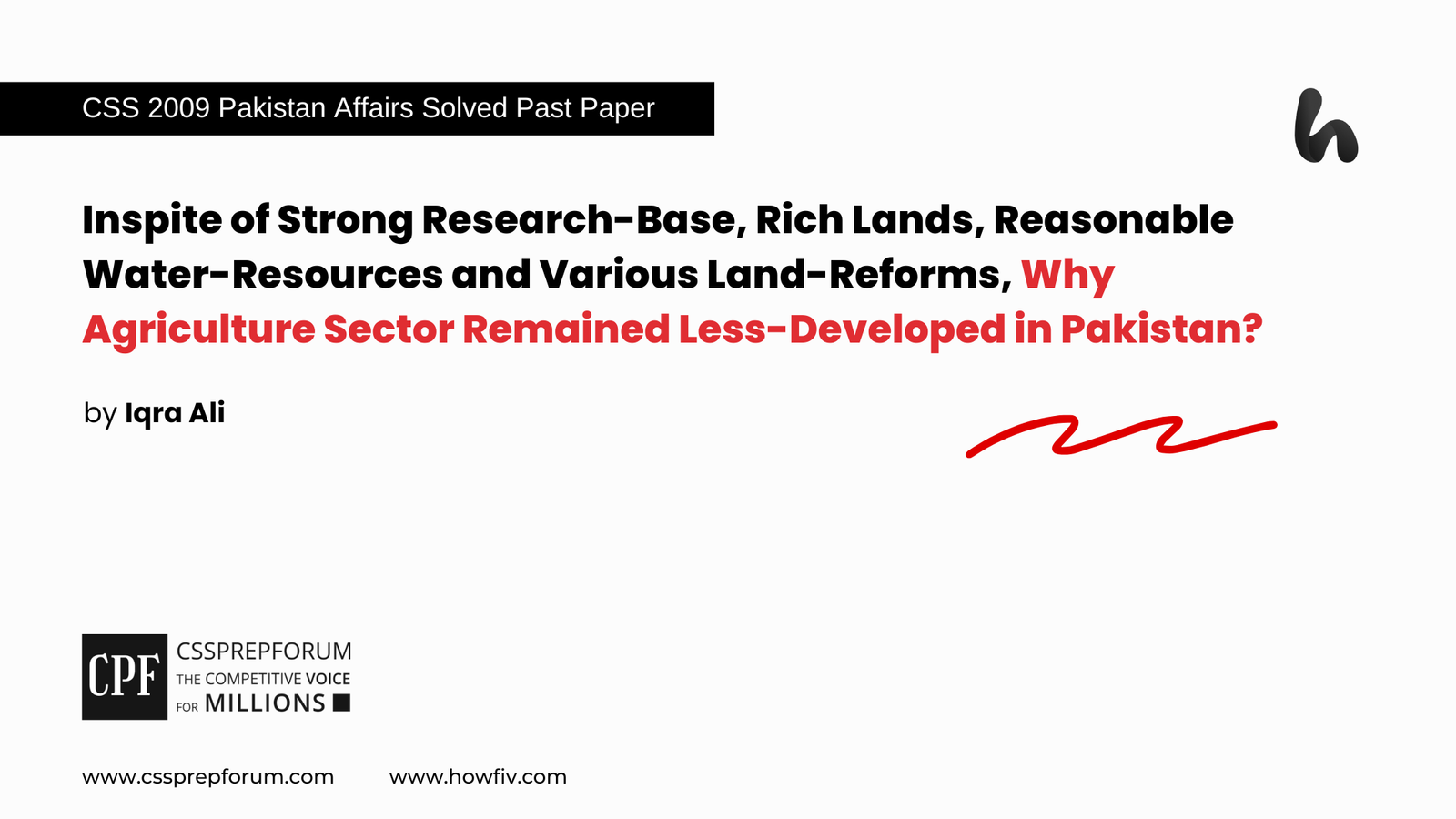CSS and PMS Solved Essays | Economic Crisis: Causes, Impacts, and Way Forward
Aamir Sohail, a Sir Syed Kazim Ali student, has attempted the CSS essay “Economic Crisis: Causes, Impacts, and Way Forward” on the given pattern, which Sir Syed Kazim Ali teaches his students. Sir Syed Kazim Ali has been Pakistan’s top English writing and CSS, PMS essay and precis coach with the highest success rate of his students. The essay is uploaded to help other competitive aspirants learn and practice essay writing techniques and patterns to qualify for the essay paper.

Outline
1- Introduction
2- Understanding the term: economic crisis
3- A brief overview of the current economic situation of Pakistan
4- What are the causes behind the severe economic crisis in the country?
- ✓Excessive reliance on the international lenders
- Case in point: Pakistan turning to the IMF for the 23rd time
- ✓Chronic political instability in the country
- Case in point: The recent political crisis resulting in the Pakistan Democratic Movement and political instability in the country
- ✓Lack of industrialization
- Case in point: The underdeveloped Automotive industry in the country; a glaring example in this case
- ✓Severe energy crisis
- Case in point: Ministry of Power Division report 2023, highlighting demand of 30,154 MW against supply of 22,000 MW
- ✓Poor governance system
- Case in point: According to Transparency International’s Corruption Perception Index, 2022, Pakistan ranks 140th out of 180 countries
- ✓Ineffective mobilization of tax resources
- Case in point: According to Pakistan’s Institute of Development Economics, the country’s tax-to-GDP ratio is stagnant at 10%
5- What are the consequences of the economic crisis in Pakistan?
- ✓Rising of twin deficits: Current Account Deficit and Fiscal Deficit
- Case in point: According to the State Bank of Pakistan, the country’s Current Account Deficit jumped to $0.5 billion in June 2023.
- ✓Leading to an undiversified economy
- Case in point: Low production and manufacturing industries in the country with heavy reliance on agriculture
- ✓Surging inflation rate
- Case in point: According to the Pakistan Bureau of Statistics report in June 2023, there is an inflation rate of 29.4%
- ✓Hindering the formation of new businesses
- Case in point: A report by the World Bank ranking Pakistan 108th out of 190 countries in the formation of a new business
- ✓Declining of Foreign Direct Investment
- Case in point: FDI decline of 23.2% as indicated by the Pakistan Economic Survey 22-23
- ✓Devaluation of Pak rupee
- Case in point: Research by Bloomberg indicating a 38% devaluation of the Pak rupee in FY 22-23
6- Suggestions to overcome the economic crisis in the country
- ✓To pursue the independent economic path
- ✓To create a charter of the economy
- ✓To boost exports and curb luxury imports
- ✓To mobilize tax collections
- ✓To improve governance system
- ✓To control the inflation rate and pursue a determined exchange rate policy
7- Conclusion

In today’s world, no nation can truly achieve greatness without a strong and independent economy that benefits all segments of society. An economically stable country is a prerequisite for inclusive politics, women empowerment, and the development of a just society. Conversely, nations that fail to establish a sound economy suffer from deplorable socio-political indicators and cannot attain prosperity. Sadly, Pakistan is currently facing a severe economic crisis that has shaken the country’s foundations and led to a quagmire of issues. Over-dependence on international lenders, chronic political instability, lack of industrialization, severe energy crisis, and poor governance are the primary reasons behind this dire situation. The consequences of this crisis are grave and can be seen in rising twin deficits, surging inflation rate, declining foreign direct investment, and devaluation of the Pakistani rupee. However, all hope is not lost, and Pakistan can overcome this crisis by introducing effective structural reforms. It is high time that the country pursued an independent economic path and created a charter of the economy. Boosting exports while curbing lavish imports will also promote economic stability. The only way to address the country’s severe economic difficulties is by taking action now. Pakistan must act decisively to overcome this crisis and achieve a prosperous future. With concerted effort and effective measures, Pakistan can emerge from this crisis stronger than ever before.
An economic crisis is a period of severe economic disruption characterised by sharp economic activity declines. It can take various forms, such as banking crises, currency crises, debt crises, and more. The common features of an economic crisis include the decline of gross domestic product (GDP) growth, tightening of monetary rates, and rising inflation rate. The world has faced several economic crises over the period of time. For instance, the global financial crisis of 2008 led to a global recession and a sharp decline in economic activity, and the COVID-19 pandemic has caused a global economic crisis, affecting businesses worldwide.
At present, Pakistan faces a severe economic crisis that has jolted the country’s foundations. The economic crisis in the country is evident from slow economic growth, rise in CAD, surge in inflation, and stagnant exports. According to the Pakistan Bureau of Statistics report in June 2023, the inflation rate in the country has reached 29.4% and is projected to increase further. The unprecedented increase in inflation has eroded the purchasing power of low-middle-income groups in the country. Further, according to the State Bank of Pakistan, the country had CAD of $0.5 billion in June 2023. The CAD has resulted in a balance of payment crisis and has led to constant devaluation of the Pak rupee in the recent two years. The economic crisis has become a looming threat to the country and has engulfed the country on all fronts.
Multiple causes have contributed to the severe economic crisis in Pakistan. First, over-dependence on international lenders leads to an economic crisis in the country. The country signed a nine-month economic stabilization program with the International Monetary Fund (IMF) in July 2023. Pakistan has a regular history of borrowing from international lenders to avert the balance of payment crisis. Since its independence, Pakistan has borrowed twenty-three times from the IMF to stabilize its economy. The borrowing comes with strict covenants and forces the country to adopt austerity measures to stem the economic decline. It raises the country’s debt, increases debt servicing costs, and makes the country vulnerable to external shocks, ultimately affecting the economic stability of the country. Hence, excessive reliance on international financial institutions leads to economic crises in the country.
Second, chronic political instability has led to the economic crisis in Pakistan. Political stability is a prerequisite for sustained economic growth and uniform business policies and leads to an inclusive economy in a country. However, Pakistan faces acute political instability that has debilitated the country’s economic progress. The country’s recent political crisis resulted in the national assembly’s dissolution and the formation of a democratic alliance called the Pakistan Democratic Movement. The constant changing of governments in the country has created uncertainty in investors’ minds unwilling to invest in a high-risk environment where economic policies change at the whelm of the new government. Therefore, frequent interventions in the democratic functioning of a government have contributed towards the economic crisis in the country.
Besides political instability, the lack of industrialization is one of the major factors behind the grave economic situation of the country. Industrialization drives economic growth, fueling production and creating employment in a country. However, Pakistan’s economy has been heavily reliant on agriculture and has failed to increase its share in manufacturing and service domains. For instance, the Automotive industry in Pakistan is a glaring example in this case, as the country only assembles cars and motorcycles and has failed to produce any of the major components, such as engines and transmissions. Several other industries demonstrate the same example, as the country relies on imports instead of building the capacity of the local industry. Hence, the lack of industrialization slows economic growth and ultimately pushes the country toward economic decline.
Furthermore, the severe energy crisis is also one of the major impediments behind the country’s economic crisis. An efficient and adequate energy supply is vital for industries and fuels the economic growth of a country. However, being an energy-starved country, Pakistan faces numerous challenges due to constrained energy resources. According to the Ministry of Division report in 2023, Pakistan’s electricity demand is 30,154 MWs, while the country produces 22,000 MWs, resulting in a shortage of over 8,000 MWs. Limited energy supply to industries affects their production patterns, increases operational costs, and raises business costs. Frequent power outages further disrupt business operations, resulting in the country’s closure and relocation of industries. Therefore, the energy crisis is a major factor behind the economic crisis in Pakistan.
In addition, the country’s poor governance system has stimulated the country’s economic crisis. A country facing a governance crisis fails to allocate its resources effectively, hold wrongdoers accountable, and efficiently deliver public services. Unfortunately, Pakistan presents a similar case as the country’s economic woes result from a poor governance. According to Transparency International’s Corruption Perception Index, 2022, Pakistan ranks 140th out of 180 countries worldwide. Corruption in the country has diverted resources away from productive activities and has resulted in unfair business practices that have created havoc on the country’s public institutions. Hence, Pakistan’s governance crisis has exacerbated the country’s economic woes.
Last but not least, the ineffective mobilization of the country’s tax resources has resulted in an economic crisis. Effective tax measures generate revenue, which is used for domestic expenditure, import payments, and averting balance of payment crises. However, Pakistan’s taxation system has proved ineffective and has failed to enhance the country’s revenue. According to Pakistan’s Institute of Development Economics, the country’s tax to Gross Domestic Product (GDP) ratio is stagnant at 10%. The low tax-to-GDP ratio has limited the government’s ability to finance public services and investments and has made the country reliant on external support to cover its expenditures. Therefore, the ineffective mobilization of tax resources has resulted in the economic crisis in Pakistan.
These causes indeed have grave consequences for Pakistan. First, the Current Account Deficit (CAD) and the fiscal deficit are the major impacts of the economic crisis that has engulfed the country. The CAD is the excess of a country’s imports over its exports, and fiscal deficit is an increase in a government’s expenditures over its savings during a financial year. According to a report by the Ministry of Finance, Pakistan’s fiscal deficit stood at 7.9% on 30th June 2023, while the State Bank of Pakistan reported CAD of $0.5 billion in June 2023. The twin deficits have resulted in lower private investments and have made the government vulnerable to external stocks due to excessive reliance on international lenders to finance its expenditures. Thus, the twin deficits are the grave impact of the economic crisis that the country faces.
Second, the economic crisis in the country has resulted in an undiversified economy. An undiversified economy depends on a few sectors and fails to venture into new industries and sectors. For instance, the economic crisis in Pakistan has made the country’s economy reliant on traditional sectors, such as agriculture and textile industry, and the country has been unable to develop innovative industries and new sectors. The undiversified economy has limited the country’s competitiveness in the world and diminished the country’s economic growth rate. Therefore, the economic crisis has led to an undiversified economy in the country.
Moreover, the unprecedented rise in the inflation rate directly impacts the economic crisis. Inflation is the general increase in the price of commodities over some time, and it erodes consumers’ purchasing power. In Pakistan, inflation has overshadowed previous boundaries and has created havoc on the low-middle income groups. According to the Pakistan Bureau of Statistics report in June 2023, the inflation rate in the country has reached 29.4% and is projected to increase further. The massive rise in the inflation rate has surged price levels for all essential items, affecting the populace’s ability to afford even the necessities. Hence, the surging inflation rate is a major impact of the economic crisis that the country faces.
Besides unprecedented inflation, the hindrances to establishing a new business are also the impact of the economic crisis. In Pakistan, the economic crisis has made it difficult for businesses to start and grow. According to a study by the World Bank, Pakistan ranks 108th out of 190 countries in the formation of a new business. Several hindrances in complex regulations, difficult access to finance, and bureaucratic delays have deterred investors from committing their capital under strict restrictions. Therefore, the impact of the economic crisis hinders the formation of new businesses.
Furthermore, the decline in Foreign Direct Investment (FDI) is one of the major impacts of the economic crisis. FDI fuels economic growth by establishing new businesses and increasing employment opportunities in a country. However, due to its economic woes, Pakistan has failed to attract FDI in recent years. This is evident as Pakistan’s Economic Survey 2022-23 indicated an FDI decline of 23.2%. Short-sighted economic policies, poor economic infrastructure, and uncertainty in the country’s economic sphere have discouraged foreign investors from investing. Hence, the decline in FDI is a result of the economic crisis.
In addition, the economic crisis has resulted in the constant devaluation of the Pak rupee. Pak rupee has depreciated significantly in the last two years against the major currencies, resulting in a balance of payment crisis in the country. According to research by Bloomberg, the Pak rupee depreciated by 38% in Financial Year 22-23. The pressure created on the Pak rupee can be illustrated by the rise in the Current Account Deficit, as the country’s imports have grown substantially and have increased the demand for foreign currencies at the expense of the local currency. Thus, the rapid devaluation of the Pak rupee results from the economic crisis.
However, despite the severity of the crisis, Pakistan can avoid it by adopting some crucial measures. First, Pakistan shall pursue an independent economic policy to overcome the crisis. Pakistan’s reliance on international lenders, especially the IMF, has influenced and shaped its macroeconomic decisions. The country has to accept and complete several conditionalities placed by the lenders to ensure the release of agreed funds. By pursuing an independent economic path, the government can freely decide how to stabilize its economy by independently pursuing fiscal and monetary tools. Hence, pursuing an independent economic path that creates a favourable environment for local investors can steer the country out of the economic crisis.
Second, the country shall create a charter of the economy to overcome the economic crisis. A charter of economy is a document that outlines the government’s economic policies and actions. Currently, the economic policies are being formulated at the will of incumbent governments with nominal input from the concerned stakeholders. However, by creating a charter, a roadmap for reform can be created that will provide a sense of certainty and stability to investors, irrespective of the changes in government. The charter shall only be created after consultation with the concerned stakeholders to ensure it is comprehensive and addresses the underlying economic problems. Hence, by creating a charter of the economy, the country can pave the way towards economic growth.
Besides creating a charter of the economy, the government shall introduce measures to boost exports while curbing lavish imports. The country’s CAD has seen a significant rise in recent years due to a massive increase in imports, while the exports have remained stagnant. It is high time that the government shall take concrete steps by providing businesses with easy access to credit, subsidies, tax advantages, and consultancy to boost their exports. In the case of imports, special measures shall be introduced to discourage luxury imports that serve the purpose of the elite class. Restrictions such as quotas, tariffs, and import duties shall be increased to curb lavish imports. Thus, the country can overcome the economic crisis by boosting exports and curbing lavish imports.
Furthermore, the effective mobilization of tax resources can assist the country to overpower the economic crisis. An effective tax system gives a country adequate revenue to finance domestic expenditures and meet external fiscal requirements. Unfortunately, Pakistan’s current % tax-to-GDP ratio of 10% is significantly below the Scandinavian countries’ ratio of over 40%, which have achieved high economic gains due to effective tax collections. By broadening the tax base, simplifying the tax code, and improving tax administration, the country can manifold its revenue to strengthen its fiscal base, ultimately overcoming the economic crisis.
In addition, the country can overcome the economic crisis by improving its governance system. Good governance is essential for the sustainable development of the economy as it ensures the rule of law, strict accountability, and adequate management of resources. Unfortunately, Pakistan faces an acute governance crisis that has hampered its economic growth. However, the country shall take measures such as strengthening public institutions, curbing corruption, and ensuring accountability to augment the governance system that will ultimately steer the country out of the economic crisis.
Last but not least, to overcome the economic crisis, the country shall adopt measures to control the inflation rate and pursue a market-determined exchange rate policy. In Pakistan, the inflation rate has reached a record high, and the exchange rate has plummeted, with massive devaluation of the Pak rupee. The country can control the unprecedented increase in inflation by tightening monetary policy and reducing government spending on non-essential items. At the same time, the exchange rate can be strengthened by reducing the government interference in the foreign exchange market and exporting more than the country’s imports. Hence, the government can overcome the economic crisis by controlling the inflation rate and following a market-determined exchange rate policy.
To conclude, Pakistan is plagued with a severe economic crisis that has dented its socio-economic fabric and led to many issues for the country. The country’s GDP growth has stagnated, foreign reserves have plummeted, and the rupee has seen a massive downward spiral. Indeed, the economy is the base upon which a nation’s progress stands. However, a weak economy can stifle a country’s progress. The reasons behind the economic crisis in Pakistan can be attributed to over-dependence on international lenders, lack of political stability, and severe energy crisis while the consequences are evident from the rising twin deficits, surging inflation rate, and devaluation of the Pak rupee. However, all hope is not lost as the country can overcome the crisis by introducing effective measures. For this purpose, the government shall pursue independent economic policies, create a charter of the economy, boost exports, and control the inflation rate to steer the country towards economic stability.

CSS Solved Past Papers’ Essays
Looking for the last ten years of CSS and PMS Solved Essays and want to know how Sir Kazim’s students write and score the highest marks in the essays’ papers? Then, click on the CSS Solved Essays to start reading them.
CSS Solved Essays
CSS 2022 Solved Essays
Are you searching for CSS 2022 solved essays by Sir Syed Kazim Ali’s students? Click on any of the topics to start reading the solved essays.
| 1- | An analysis of the concept of globalization of markets. |
| 2- | Digital democracy: social media and political participation. |
| 3- | Global trade and trade policies of China. |
| 4- | “Imagination is more important than knowledge”. |
| 5- | Global politics and international relations. |
| 6- | The controversial issues of feminism in contemporary women’s rights movements. |
| 7- | World food systems: the economics of agriculture. |
| 8- | Is there such a thing as ethical consumerism? |
| 9- | Human development and economic sustainability. |
| 10- | How are terrorism and its perception shaped by the Mass Media? |
CSS Solved General Science & Ability Past Papers
Want to read the last ten years’ General Science & Ability Solved Past Papers to learn how to attempt them and to score high? Let’s click on the link below to read them all freely. All past papers have been solved by Miss Iqra Ali & Dr Nishat Baloch, Pakistan’s top CSS GSA coach having the highest score of their students. General Science & Ability Solved Past Papers
Articles Might Interest You!
The following are some of the most important articles for CSS and PMS aspirants. Click on any to start reading.












